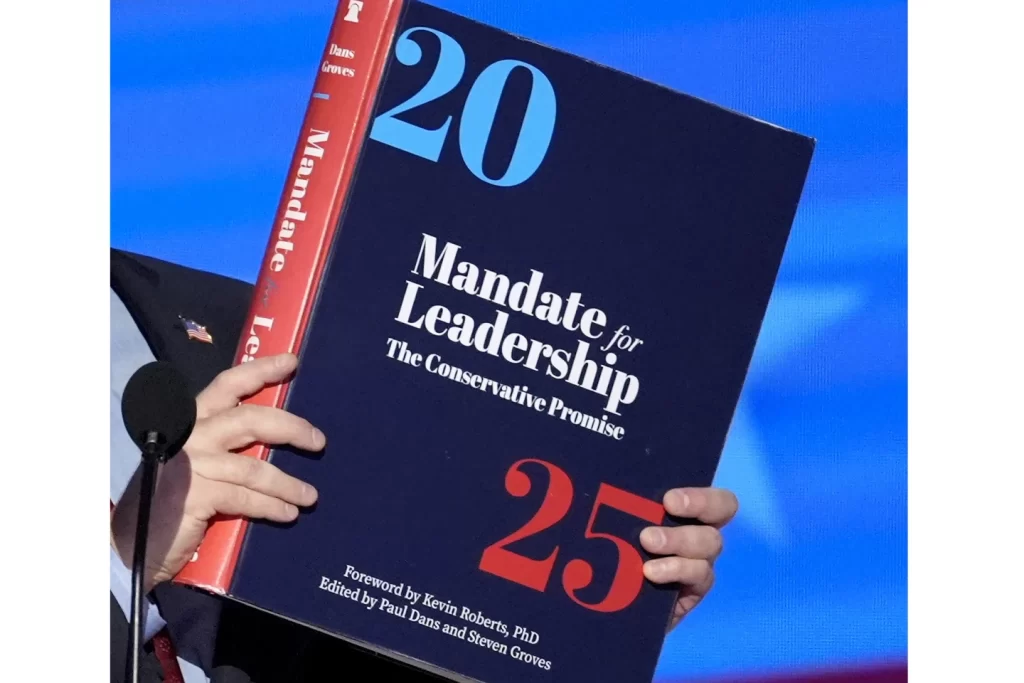
WASHINGTON — As a former and potentially future president, Donald Trump hailed what would become Project 2025 as a road map for “exactly what our movement will do” with another crack at the White House.
As the blueprint for a hard-right turn in America became a liability during the 2024 campaign, Trump pulled an about-face. He denied knowing anything about the “ridiculous and abysmal” plans written in part by his first-term aides and allies.
Now, after being elected the 47th president on Nov. 5, Trump is stocking his second administration with key players in the detailed effort he temporarily shunned. Most notably, Trump has tapped Russell Vought for an encore as director of the Office of Management and Budget; Tom Homan, his former immigration chief, as “border czar;” and immigration hardliner Stephen Miller as deputy chief of policy.
Those moves have accelerated criticisms from Democrats who warn that Trump’s election hands government reins to movement conservatives who spent years envisioning how to concentrate power in the West Wing and impose a starkly rightward shift across the U.S. government and society.
Trump and his aides maintain that he won a mandate to overhaul Washington. But they maintain the specifics are his alone.
What to know about Trump’s second term:
- Staffing the administration: Here are the people Trump has picked for key positions so far. Plus, a look at recess appointments and how could Trump use them to fill his Cabinet.
“President Trump never had anything to do with Project 2025,” said Trump spokeswoman Karoline Leavitt in a statement. “All of President Trumps’ Cabinet nominees and appointments are whole-heartedly committed to President Trump’s agenda, not the agenda of outside groups.”
Here is a look at what some of Trump’s choices portend for his second presidency.
As budget chief, Vought envisions a sweeping, powerful perch
The Office of Management and Budget director, a role Vought held under Trump previously and requires Senate confirmation, prepares a president’s proposed budget and is generally responsible for implementing the administration’s agenda across agencies.
The job is influential but Vought made clear as author of a Project 2025 chapter on presidential authority that he wants the post to wield more direct power.
“The Director must view his job as the best, most comprehensive approximation of the President’s mind,” Vought wrote. The OMB, he wrote, “is a President’s air-traffic control system” and should be “involved in all aspects of the White House policy process,” becoming “powerful enough to override implementing agencies’ bureaucracies.”
Trump did not go into such details when naming Vought but implicitly endorsed aggressive action. Vought, the president-elect said, “knows exactly how to dismantle the Deep State” — Trump’s catch-all for federal bureaucracy — and would help “restore fiscal sanity.”
In June, speaking on former Trump aide Steve Bannon’s “War Room” podcast, Vought relished the potential tension: “We’re not going to save our country without a little confrontation.”
Vought could help Musk and Trump remake government’s role and scope
The strategy of further concentrating federal authority in the presidency permeates Project 2025’s and Trump’s campaign proposals. Vought’s vision is especially striking when paired with Trump’s proposals to dramatically expand the president’s control over federal workers and government purse strings — ideas intertwined with the president-elect tapping mega-billionaire Elon Musk and venture capitalist Vivek Ramaswamy to lead a “Department of Government Efficiency.”
Trump in his first term sought to remake the federal civil service by reclassifying tens of thousands of federal civil service workers — who have job protection through changes in administration — as political appointees, making them easier to fire and replace with loyalists. Currently, only about 4,000 of the federal government’s roughly 2 million workers are political appointees. President Joe Biden rescinded Trump’s changes. Trump can now reinstate them.
Meanwhile, Musk’s and Ramaswamy’s sweeping “efficiency” mandates from Trump could turn on an old, defunct constitutional theory that the president — not Congress — is the real gatekeeper of federal spending. In his “Agenda 47,” Trump endorsed so-called “impoundment,” which holds that when lawmakers pass appropriations bills, they simply set a spending ceiling, but not a floor. The president, the theory holds, can simply decide not to spend money on anything he deems unnecessary.
Vought did not venture into impoundment in his Project 2025 chapter. But, he wrote, “The President should use every possible tool to propose and impose fiscal discipline on the federal government. Anything short of that would constitute abject failure.”
Trump’s choice immediately sparked backlash.
“Russ Vought is a far-right ideologue who has tried to break the law to give President Trump unilateral authority he does not possess to override the spending decisions of Congress (and) who has and will again fight to give Trump the ability to summarily fire tens of thousands of civil servants,” said Sen. Patty Murray of Washington, a Democrat and outgoing Senate Appropriations chairwoman.
Reps. Jamie Raskin of Maryland and Melanie Stansbury of New Mexico, leading Democrats on the House Committee on Oversight and Accountability, said Vought wants to “dismantle the expert federal workforce” to the detriment of Americans who depend on everything from veterans’ health care to Social Security benefits.



